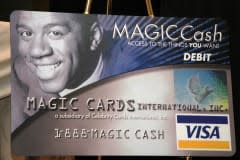Whatever Happened to Celebrity-Sponsored Prepaid Debit Cards?

Celebrities don't make the best financiers. Several years ago, a handful famous people jumped into the prepaid debit card business, only to find it wasn't quite the easy route to profits they might have believed it to be.
Perhaps they were under that impression because, to coin an old phrase, the financial sector is where the money is. But succeeding in it can be much trickier than it looks.
Fed by All Those Fees
It's easy to understand why the prepaid card market would be appealing for someone looking for a good side business. In a word: fees.
Using a prepaid card generates a raft of payouts for the customer. These can include activation fees, monthly subscription fees, loading fees, ATM withdrawal fees (not to mention ATM balance inquiry fees), customer service fees ... and on and on.
How can card issuers tack on so many costs to a simple financial instrument? After all, a typical credit or debit card using the Visa (V) or MasterCard (MA) network carries few if any fees for the user.
But prepaid cards are targeted towards a different kind of customer -- lower-income individuals, and those who can have a difficult time securing financial instruments (such as teenagers). Many of these folks lack the income or credit score for a traditional credit card and might not have the means to satisfy the requirements of a traditional bank account.
In other words, since they have limited options, as a group these individuals are virtually a captive market for prepaid products.
I'd Just Like an Autograph Instead, Thanks
But even a captive market has a choice. And for the most part it's chosen not to apply for cards associated with celebrities.

Much of this has to do with bad press. In 2010, America's first family of reality television, the Kardashians, rolled out its own prepaid MasterCard. Almost instantly, they were hit with a firestorm of criticism over what one commentator (who happened to be the attorney general of Connecticut) described as "pernicious and predatory fees."
The Kardashian Kard had a laundry list of these; all told, 18 activities generated costs for the card holder. Some of the more egregious were a minimum purchase fee of $59.95 and a point of sale decline fee of $1 per transaction.
America likes to keep up with the Kardashians, but it's obviously not interested in doing business with them. Mere weeks after it launched, the Kardashian Kard was discontinued.
Same goes for the Magic card backed by its namesake, Hall of Fame basketball star and busy entrepreneur Earvin "Magic" Johnson and TV finance advice-giver Suze Orman's optimistically named Approved card. Both cards were met with disapproval. Both cards were on the market for barely two years before being discontinued this summer.
Banks Vs. Celebrities
Another big problem the celebrities faced was competition. The returns on prepaid cards were attractive enough to draw the grizzled veterans of the financial industry into the market, and they turned up the competitive heat.
In 2011, American Express (AXP) launched its Serve prepaid card. The following year PNC Financial Services Group (PNC), one of the largest regional banking conglomerates in the country, began issuing its Visa-branded SmartAccess card, making it available in all of its nearly 3,000 branches. And JPMorganChase (JPM) poured its Liquid card onto the market the same year.
It's hard to go up against major bank or credit card companies and beat them at their own game. In contrast to many of those abandoned celebrity cards, AmEx's Serve has no activation fee if purchased online. The monthly fee is $1, waived if the user lives in a certain state or fulfills one of several not-too-burdensome financial obligations.
JPMorgan Chase's prepaid plastic, meanwhile, will set a customer back $4.95 per month, but after that the list of fees is pretty thin. There's a $2 charge per non-Chase ATM withdrawal or balance inquiry (domestic or international) and a few fees for relatively esoteric activities ($8 to process a Chase cashier's check, for instance, or $5 per money order).
Retreating Back to the Stage
Celebrities who dipped their toes into the prepaid card pool were clearly hoping that their fan base was wide and financially disadvantaged enough to provide a good market for their product.
They misjudged those potential customers by a long shot. These days, most of those stars have gone back to what they do best. There are famous names making money on prepaid at the moment, but those tend to be Chase and AmEx rather than Kim, Magic or Suze.
Motley Fool contributor Eric Volkman has no position in any stocks mentioned. The Motley Fool recommends American Express, MasterCard, and Visa. The Motley Fool owns shares of JPMorgan Chase, MasterCard, PNC Financial Services, and Visa. Try any Motley Fool newsletter service free for 30 days.

